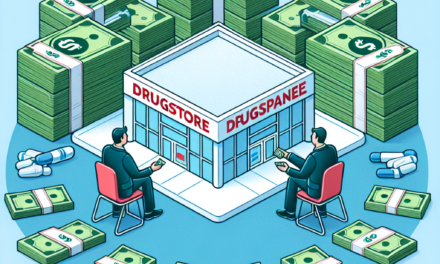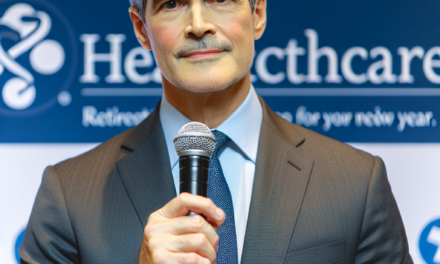Evernorth Partners with Novo Nordisk and Eli Lilly to Limit GLP-1 Copays
The rising prevalence of obesity and diabetes has led to an increased demand for effective treatments, particularly GLP-1 receptor agonists, which have shown significant efficacy in managing these conditions. However, the high cost of these medications often poses a barrier to access for many patients. In a groundbreaking initiative, Evernorth, the health services segment of Cigna, has partnered with pharmaceutical giants Novo Nordisk and Eli Lilly to limit copayments for GLP-1 medications. This article delves into the implications of this partnership, exploring its potential impact on patients, healthcare systems, and the pharmaceutical industry.
Understanding GLP-1 Receptor Agonists
GLP-1 receptor agonists are a class of medications that mimic the action of the glucagon-like peptide-1 hormone, which plays a crucial role in glucose metabolism and appetite regulation. These medications are primarily used to treat type 2 diabetes and obesity, with several options available on the market, including:
- Semaglutide (Ozempic, Wegovy)
- Liraglutide (Victoza, Saxenda)
- Dulaglutide (Trulicity)
- Exenatide (Byetta, Bydureon)
These drugs have been shown to not only lower blood sugar levels but also promote weight loss, making them a dual-purpose treatment for patients struggling with both diabetes and obesity. The effectiveness of GLP-1 receptor agonists has led to their increasing popularity among healthcare providers and patients alike.
However, the high cost of these medications can be prohibitive. For instance, the average monthly cost of semaglutide can exceed $1,000 without insurance coverage. This financial burden often results in patients either forgoing treatment or not adhering to prescribed regimens, which can lead to worsening health outcomes.
The Role of Evernorth in Healthcare Innovation
Evernorth, as Cigna’s health services arm, aims to create innovative solutions that improve healthcare access and affordability. The partnership with Novo Nordisk and Eli Lilly represents a strategic move to address the financial barriers associated with GLP-1 medications. By limiting copayments, Evernorth seeks to enhance patient access to these essential treatments.
Key initiatives by Evernorth include:
- Developing value-based care models that align incentives for patients, providers, and payers.
- Implementing programs that focus on chronic disease management and prevention.
- Leveraging data analytics to identify high-risk patients and tailor interventions accordingly.
This partnership is particularly significant in the context of rising healthcare costs and the increasing prevalence of chronic diseases. By collaborating with leading pharmaceutical companies, Evernorth is positioning itself as a leader in the movement towards more affordable and accessible healthcare solutions.
Impact on Patients and Healthcare Systems
The collaboration between Evernorth, Novo Nordisk, and Eli Lilly is poised to have a profound impact on patients and healthcare systems. By limiting copayments for GLP-1 medications, the initiative aims to improve medication adherence and health outcomes for individuals with diabetes and obesity.
Some potential benefits for patients include:
- Increased access to effective treatments, leading to better management of diabetes and obesity.
- Reduced financial burden, allowing patients to prioritize their health without the stress of high out-of-pocket costs.
- Improved health outcomes, as consistent use of GLP-1 medications can lead to significant weight loss and better glycemic control.
From a healthcare system perspective, the partnership could lead to:
- Lower overall healthcare costs due to reduced complications associated with poorly managed diabetes and obesity.
- Decreased hospitalizations and emergency room visits, as patients are more likely to manage their conditions effectively.
- Enhanced quality of life for patients, which can translate into increased productivity and reduced absenteeism in the workforce.
Moreover, the initiative aligns with broader public health goals aimed at combating the obesity epidemic and reducing the burden of chronic diseases on healthcare systems. By making GLP-1 medications more accessible, Evernorth and its partners are contributing to a healthier population and a more sustainable healthcare model.
Challenges and Considerations
While the partnership between Evernorth, Novo Nordisk, and Eli Lilly presents numerous benefits, it is not without challenges. Several factors must be considered to ensure the success of this initiative.
Some of the key challenges include:
- Insurance Coverage Variability: Not all insurance plans may cover GLP-1 medications, which could limit the effectiveness of copayment reductions.
- Patient Education: Ensuring that patients are aware of the availability of these medications and the reduced copayments is crucial for maximizing impact.
- Market Dynamics: The pharmaceutical market is constantly evolving, and competition among drug manufacturers may influence pricing and availability.
Additionally, there is a need for ongoing evaluation of the program’s effectiveness. Metrics such as medication adherence rates, health outcomes, and overall healthcare costs should be monitored to assess the impact of the initiative. This data will be essential for making informed decisions about future partnerships and programs aimed at improving access to essential medications.
The Future of GLP-1 Medications and Healthcare Partnerships
The partnership between Evernorth, Novo Nordisk, and Eli Lilly marks a significant step towards addressing the financial barriers associated with GLP-1 medications. As the healthcare landscape continues to evolve, collaborations like this will be crucial in ensuring that patients have access to the treatments they need.
Looking ahead, several trends are likely to shape the future of GLP-1 medications and healthcare partnerships:
- Increased Focus on Value-Based Care: As healthcare systems shift towards value-based care models, partnerships that prioritize patient outcomes and cost-effectiveness will become more prevalent.
- Advancements in Technology: The integration of technology in healthcare, such as telemedicine and digital health tools, will enhance patient engagement and adherence to treatment plans.
- Policy Changes: Legislative efforts aimed at reducing drug prices and improving access to medications will play a critical role in shaping the future of healthcare partnerships.
Ultimately, the success of the Evernorth partnership will depend on its ability to adapt to these trends and continue prioritizing patient access to essential medications. By fostering collaboration among stakeholders in the healthcare ecosystem, there is potential for significant improvements in health outcomes and overall quality of care.
Conclusion
The partnership between Evernorth, Novo Nordisk, and Eli Lilly represents a pivotal moment in the fight against diabetes and obesity. By limiting copayments for GLP-1 medications, this initiative aims to enhance patient access to effective treatments, ultimately leading to better health outcomes and reduced healthcare costs.
As the healthcare landscape continues to evolve, collaborations like this will be essential in addressing the financial barriers that prevent patients from accessing necessary medications. By focusing on value-based care, leveraging technology, and advocating for policy changes, stakeholders can work together to create a more equitable healthcare system.
In summary, the Evernorth partnership is a promising step towards improving access to GLP-1 medications, and its success could serve as a model for future initiatives aimed at enhancing patient care and reducing the burden of chronic diseases on healthcare systems.





